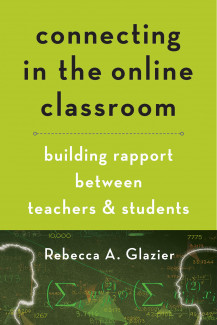
Johns Hopkins UniversityEst. 1876
America’s First Research University
Now Browsing:
Connecting in the Online Classroom

By Rebecca A. Glazier
By about my second semester of teaching online, I knew I had a problem. I was an engaged and enthusiastic teacher in the classroom. Still, I received no training in teaching online, and transitioning my lectures and discussions into an asynchronous online format did not go well. I was blissfully unaware of just how bad things were until I took a look at the retention rates for my online classes. I found that many more students were failing and dropping out of my online courses compared to my face-to-face courses. As a professor who cares deeply about my students and as a social scientist, this retention gap was a puzzle I needed to solve.
More than 12 years later, I have surveyed thousands of students, gathered qualitative and quantitative data, run experiments, and reviewed scores of prior studies. The results are precise: when online instructors build rapport with their students, those students are more likely to succeed. I present these results in my new book, Connecting in the Online Classroom: Building Rapport between Teachers and Students. Building rapport with students means letting students know that their professors are on their side in this whole learning endeavor. It means good communication, supportive messages, informative feedback, and authentic caring. In short, building rapport with students is connecting with them on a human level to support their learning so that students know their success matters. When I made a deliberate effort to build rapport with the students in my online classes, I completely eliminated the retention gap.
When many of us were forced to move our classes online due to the COVID-19 pandemic, we quickly learned just how important—and how challenging—it is to build rapport with students in the online environment. Staring at a sea of blank screens can be demoralizing, and the give-and-take of discussion has to find a new rhythm when it doesn't occur face-to-face. We all know intuitively how important it is to connect with our students. In this new book, I present research, data, and experimental studies to demonstrate how building rapport with students improves retention and success, so we don't have to rely on intuition alone. The complex numbers, experimental results, and successful case studies are just the kind of evidence pedagogy-minded faculty can use to persuade administrators that relationship-building is worth the investment.

Anyone who teaches online, whether it be a single online course or an exclusively online load, will find in this book a plethora of research-backed strategies that they can implement right away. They will also find new evidence for why prioritizing rapport in online courses—and closing the retention gap—is a critical equity issue for higher education. Students taking online classes represent a key part of the college-attending population, but they are often treated as second-class students. Many of our online students are first-generation, working parents, students of color, or lower-income students. When retention rates in online classes are significantly and persistently lower than in face-to‑face classes, and we continue to ignore that fact, we are setting these marginalized students up to fail. Rapport-building can eliminate the online retention gap and help close some of the equity gaps that so persistently plague higher education.
Filled with concrete recommendations, sound social science, and quotes from students, many different audiences will find something for them in this book. Faculty will leave inspired and encouraged with regard to their own teaching; administrators will find clear direction for creating a campus culture that values high-quality online education to improve student retention; students will feel better prepared for success in online classes.
As higher education continues to adjust to a new learning reality due to the COVID-19 pandemic, Connecting in the Online Classroom presents a way forward that centers human connection in a way that makes teaching more meaningful for faculty—improving learning for students, and addressing the online retention crisis facing so many colleges and universities.
Rebecca A. Glazier is an associate professor of political science in the School of Public Affairs at the University of Arkansas at Little Rock. She has been teaching online and researching in the scholarship of teaching and learning since 2009. She is the author of Connecting in the Online Classroom: Building Rapport between Teachers and Students.

By about my second semester of teaching online, I knew I had a problem. I was an engaged and enthusiastic teacher in the classroom. Still, I received no training in teaching online, and transitioning my lectures and discussions into an asynchronous online format did not go well. I was blissfully unaware of just how bad things were until I took a look at the retention rates for my online classes. I found that many more students were failing and dropping out of my online courses compared to my face-to-face courses. As a professor who cares deeply about my students and as a social scientist, this retention gap was a puzzle I needed to solve.
More than 12 years later, I have surveyed thousands of students, gathered qualitative and quantitative data, run experiments, and reviewed scores of prior studies. The results are precise: when online instructors build rapport with their students, those students are more likely to succeed. I present these results in my new book, Connecting in the Online Classroom: Building Rapport between Teachers and Students. Building rapport with students means letting students know that their professors are on their side in this whole learning endeavor. It means good communication, supportive messages, informative feedback, and authentic caring. In short, building rapport with students is connecting with them on a human level to support their learning so that students know their success matters. When I made a deliberate effort to build rapport with the students in my online classes, I completely eliminated the retention gap.
When many of us were forced to move our classes online due to the COVID-19 pandemic, we quickly learned just how important—and how challenging—it is to build rapport with students in the online environment. Staring at a sea of blank screens can be demoralizing, and the give-and-take of discussion has to find a new rhythm when it doesn't occur face-to-face. We all know intuitively how important it is to connect with our students. In this new book, I present research, data, and experimental studies to demonstrate how building rapport with students improves retention and success, so we don't have to rely on intuition alone. The complex numbers, experimental results, and successful case studies are just the kind of evidence pedagogy-minded faculty can use to persuade administrators that relationship-building is worth the investment.

Anyone who teaches online, whether it be a single online course or an exclusively online load, will find in this book a plethora of research-backed strategies that they can implement right away. They will also find new evidence for why prioritizing rapport in online courses—and closing the retention gap—is a critical equity issue for higher education. Students taking online classes represent a key part of the college-attending population, but they are often treated as second-class students. Many of our online students are first-generation, working parents, students of color, or lower-income students. When retention rates in online classes are significantly and persistently lower than in face-to‑face classes, and we continue to ignore that fact, we are setting these marginalized students up to fail. Rapport-building can eliminate the online retention gap and help close some of the equity gaps that so persistently plague higher education.
Filled with concrete recommendations, sound social science, and quotes from students, many different audiences will find something for them in this book. Faculty will leave inspired and encouraged with regard to their own teaching; administrators will find clear direction for creating a campus culture that values high-quality online education to improve student retention; students will feel better prepared for success in online classes.
As higher education continues to adjust to a new learning reality due to the COVID-19 pandemic, Connecting in the Online Classroom presents a way forward that centers human connection in a way that makes teaching more meaningful for faculty—improving learning for students, and addressing the online retention crisis facing so many colleges and universities.
Rebecca A. Glazier is an associate professor of political science in the School of Public Affairs at the University of Arkansas at Little Rock. She has been teaching online and researching in the scholarship of teaching and learning since 2009. She is the author of Connecting in the Online Classroom: Building Rapport between Teachers and Students.

Login to View & Leave Comments
Login to View & Leave Comments

